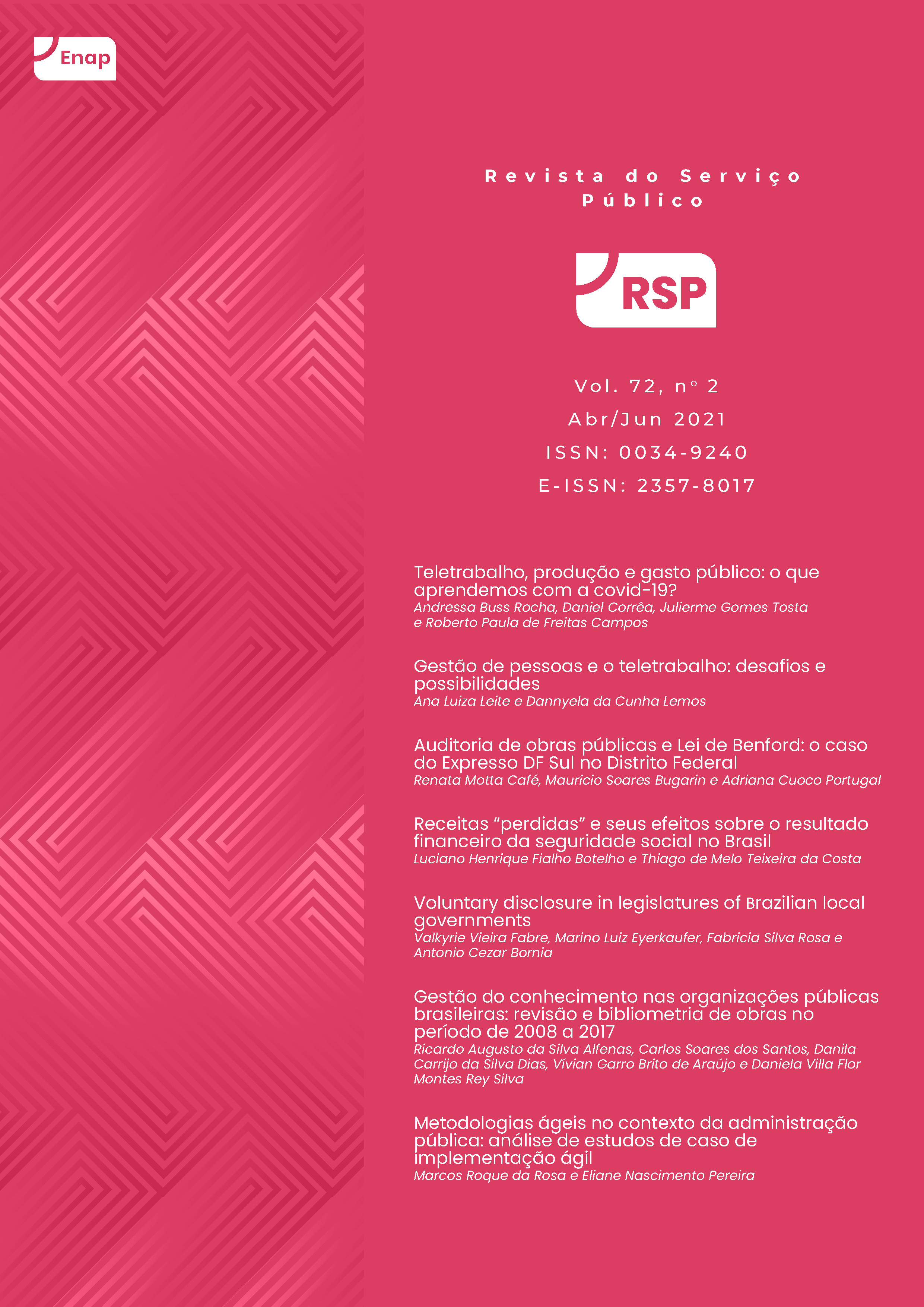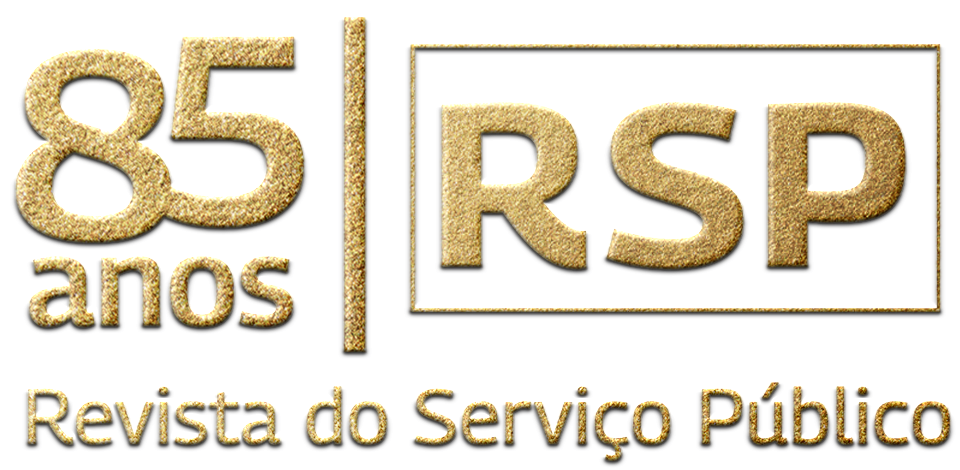Agile methodologies in the context of public administration
research implementation of agile study cases
DOI:
https://doi.org/10.21874/rsp.v72i2.4310Keywords:
agile methodologies, public administration, project management, study casesAbstract
Adoption of agile methodologies requires changing mindset and delivery speed. The use of Agile practices in public administration has many faced challenges, large bureaucracy, process and culture. The Agile may help service delivery and increase satisfaction. The objective of this work is to research implementation of Agile methodology study cases in the public administration, in order to report the practices and results of this application. To develop this work a research was carried out, based on the last seven years of scientific publications in Science Direct, Scopus and Web of Science periodical databases. Through the research, studies were identified with reported application practices of Agile Methodology in the global and Brazilian public administration scenarios. By exploring the researches, studies address ways to start a project, its difficulties and benefits. This work shows that the culture is still the highest challenge to adopting Agile. The use of this methodology requires planning, collaboration, documentation and adaptability during a process.
Downloads
References
AGILEMANIFESTO.ORG. Principles behind the Agile Manifesto. 2001. Disponível em: <http://agilemanifesto.org/principles.html>. Acesso em: 10 dez. 2020.
ALTUKHOVA, N.; VASILEVA, E.; SLAVIN, B. Concept for a new approach to project management in the activities of public servants. Business Informatics, v. 2016, n. 4, p. 60-69, 2016.
BECK, K. et al. Manifesto for Agile Software Development. 2001. Disponível em: <http://agilemanifesto.org/>. Acesso em: 10 dez. 2020.
BERKANI, A.; CAUSSE, D.; THOMAS, L. Triggers analysis of an agile transformation: the case of a central bank. Procedia Computer Science, v. 164, p. 449-456, 2019.
BOGDANOVA, M. et al. Agile project management in governmental organizations – methodological issues. IJASOS- International E-journal of Advances in Social Sciences, v. 6, n. 16, p. 262-275, 2020.
BRASIL. Ministério do Planejamento, Orçamento e Gestão. Secretaria de Logística e Tecnologia da Informação. Guia de Projetos de Software com Práticas de Métodos Ágeis para o Sisp.Vol. 1. 2015. 90 p.
DA SILVA, D. A. et al. Health care transformation: an academic application system case study. IFAC-PapersOnLine, v. 51, n. 27, p. 413-418, 2018.
DIGITAL.AI. 14th annual State of Agile Report. Annual Report for the State of Agile, v. 14, n. 14, p. 2-19, 2020.
HIGHSMITH, J. The Agile Manifesto History. 2001. Disponível em: <https://agilemanifesto.org/history.html>. Acesso em: 10 dez. 2020.
IMPROTA, G. et al. Agile six sigma in healthcare: case study at santobono pediatric hospital. International Journal of Environmental Research and Public Health, v. 17, n. 3, p. 1-17, 2020.
MEDEIROS, J. et al. Quality of software requirements specification in agile projects: a cross-case analysis of six companies. Journal of Systems and Software, v. 142, n. November 2017, p. 171-194, 2018.
MEIRELLES, P. et al. Brazilian Public Software Portal: an integrated platform for collaborative development. In: INTERNATIONAL SYMPOSIUM ON OPEN COLLABORATION (OPENSYM), 13., 2017, Galway, Ireland. Anais […]. OpenSym '17: Proceedings of the 13th International Symposium on Open Collaboration,2017. p. 1–10.
MERGEL, I. Agile innovation management in government: a research agenda. Government Information Quarterly, v. 33, n. 3, p. 516–523, 2016.
OLIVEIRA, R. A. de et al. Desafios no uso de metodologias ágeis de gestão de projetos em órgãos públicos: um estudo de caso da Receita Estadual do Paraná. Revista de Gestão e Projetos, v. 11, n. 2, p. 12-36, 2020.
PONTES, R. E. DA S.; NETO, J. S. Contratação do desenvolvimento ágil de software na administração pública federal: riscos e ações mitigadoras. Revista do Serviço Público, v. 66, n. 1, p. 97-120, 31 mar. 2015.
RIBEIRO, A.; DOMINGUES, L. Acceptance of an agile methodology in the public sector. Procedia Computer Science, v. 138, p. 621-629, 2018.
SCHWABER, K.; SUTHERLAND, J. The 2020 Scrum Guide. Disponível em: <https://www.scrumguides.org/scrum-guide.html>. Acesso em: 11 dez. 2020.
SCRUM.ORG. What is Scrum ? Disponível em: <https://www.scrum.org/resources/what-is-scrum>. Acesso em: 10 dez. 2020.
SOE, R. M.; DRECHSLER, W. Agile local governments: experimentation before implementation. Government Information Quarterly, v. 35, n. 2, p. 323-335, 2018.
TRIBUNAL DE CONTAS DA UNIÃO (TCU). Acórdão no 2314/2013 TCU/Plenário. 2013. Disponível em: <https://contas.tcu.gov.br/sagas/SvlVisualizarRelVotoAcRtf?codFiltro=SAGAS-SESSAO-ENCERRADA&seOcultaPagina=S&item0=483300>.
TORRECILLA-SALINAS, C. J. et al. Agile in public administration: oxymoron or reality? An experience report. CEUR Workshop Proceedings, v. 1017, p. 1-8, 2013.
TRANFIELD, D.; DENYER, D.; SMART, P. Towards a methodology for developing evidence-informed management knowledge by means of systematic review. British Journal of Management, v. 14, n. 3, p. 207-222, set. 2003.
Downloads
Published
How to Cite
Issue
Section
License
Copyright (c) 2021 Revista do Serviço Público

This work is licensed under a Creative Commons Attribution-NonCommercial-ShareAlike 4.0 International License.
- A RSP adota a licença Creative Commons (CC) do tipo Atribuição – Uso Não-Comercial (BY-NC).
- A licença permite que outros remixem, adaptem e criem obra licenciada, sendo proibido o uso com fins comerciais.
- As novas obras devem fazer referência ao autor nos créditos e não podem ser usadas com fins comerciais, porém não precisam ser licenciadas sob os mesmos termos dessa licença.
- Ao publicar o artigo na RSP, o autor cede e transfere para a ENAP os direitos autorais patrimoniais referentes ao artigo.
- O artigo publicado na RSP não poderá ser divulgado em outro meio sem a devida referência à publicação de origem.
- O autor que tiver o artigo publicado na RSP deverá assinar o Termo de Concessão de Direitos Autorais (em momento oportuno a editoria da Revista entrará em contato com o autor para assinatura do Termo).



